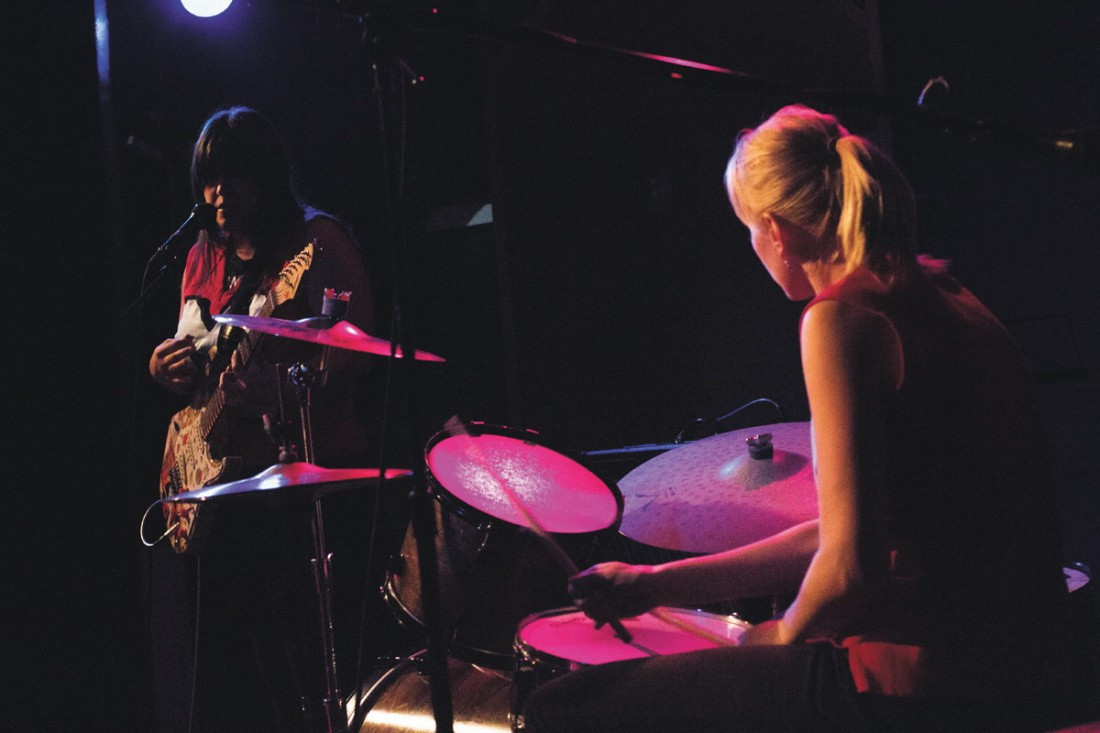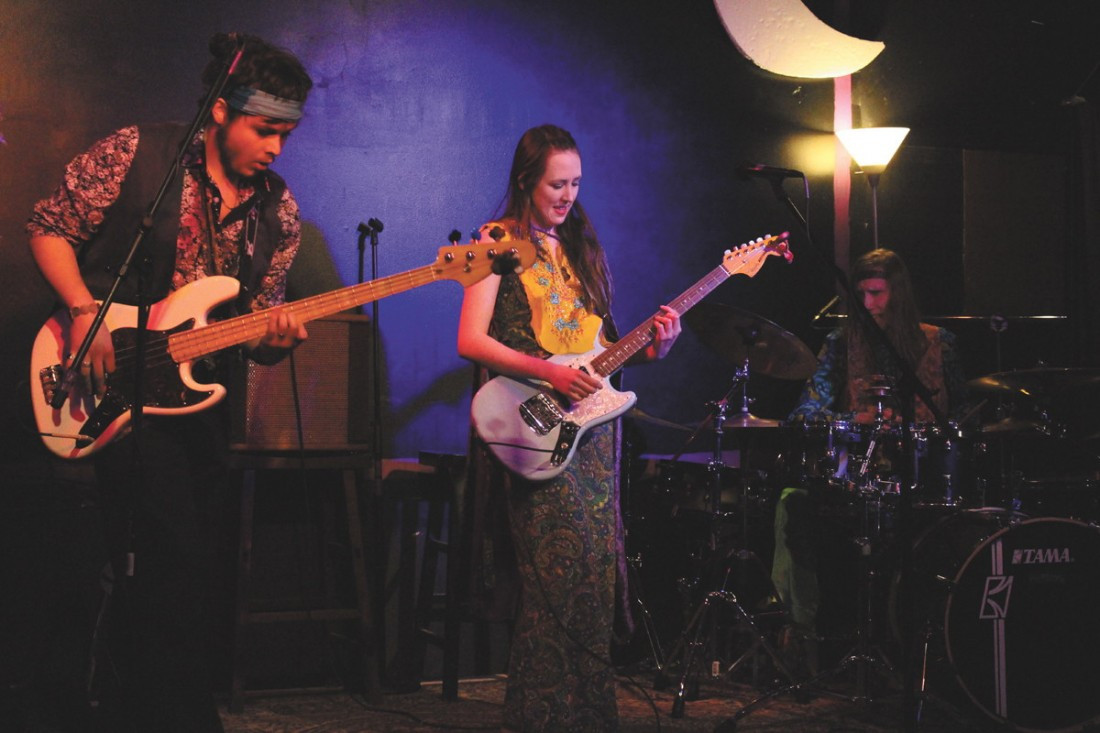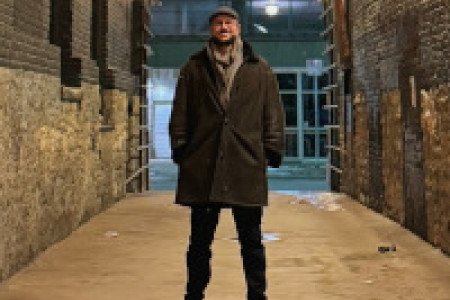Girls to the Front
COOTIE CLUB SPEARHEADS DISCUSSION ABOUT SAFE SPACES IN MUSIC
Winnipeg’s music scene can be a straight, white, able-bodied boys’ club, but some people have been working over the last few months to try and change that stereotype.
Cootie Club started meeting last October at the Purple Room. The group’s mandate is to serve as a safe space for women and non-binary trans people to perform.
The club is organized by five to ten different people and strives to hold a showcase the second Friday of every second month, though that’s subject to change.
“There wasn’t a particular event that got the club in motion, we just wanted to create a place where people felt safe and can meet like-minded people because that can be a bit of a problem in music some of the time,” Cootie Club organizer Kelly Campbell says. She also plays guitar and sings with pop-punk trio, Mulligrub.
“I don’t really feel like I want to say if our music scene is safe or not. There’s definitely a lot of problems, but there’s problems everywhere and I feel like there’s people who are making an effort to make it safer and actively work towards it happening. I think nightlife by its nature is not that safe, but it depends on the situation,” Campbell adds.
Paige Drobot played the Feb. 13 Cootie Club showcase with her band The Psychics and admits to sometimes feeling unsafe when performing at other venues in the city.
She also says that cheap covers are part of the problem because they don’t keep out the regulars that are just there to drink and don’t care about the music being performed.
“You’re out for a smoke before your own show and people are trying to buy you. I’ve had people assume that I’m a prostitute when I’ve been standing outside of certain venues,” Drobot, 21, says.
“Someone from a venue I won’t name also said ‘I thought you might have worn something a little more sexy’ when we were loading in. There’s nothing wrong with wearing crop-tops if that’s what you want, but they shouldn’t be a requirement.”

M&M Meats - Credit: Supplied
In order to keep the events safe, volunteers wearing pink bandanas serve as conflict resolution managers. Anyone who feels unsafe is welcome to speak to them at any time and have their voices heard. So far no one has been kicked out of Cootie Club.
“If someone feels uncomfortable they usually don’t want to talk about it, but we want to make sure the option is there if they want it,” Campbell says.
Aside from creating safe spaces Cootie Club also strives to increase representation of people from all different backgrounds. Part of the reason they chose the Purple Room is because it’s a wheelchair accessible venue.
“It’s hard to represent everyone without being tokenizing,” Wren Robertson, who wore a pink bandana at the Feb. 13 showcase, says.
“But it’s a risk you have to take. I think the difference between tokenizing and not is the desire to build real relationships with real people, which is what we’re trying to do,” Campbell adds.
All genres are welcome at Cootie Club, and the Feb. 13 edition even included a poetry reading from Queen Tite. Despite what the name might suggest, men are welcome to watch the performances and even hit the stage.
“If you’re reading this thing and you want to be involved you should probably just ask us because we’ll probably say yes,” Campbell says.
“I like that they give people a chance to play a show and play without knowing them. It can be hard getting shows when you’re starting out and don’t really know anyone,” Drobot adds.
Drobot also appreciates that she can go to Cootie Club and meet other women who are into playing music, which she says can be hard to come across in this city.
“I can count on one hand the number of shows I’ve played where there was another girl on the bill,” Drobot says.

The Psychics - Credit: Deborah Remus
But that still hasn’t stopped her from picking up an electric guitar. She’s wrapping up recording The Psychics’ first record, You Don’t Have to Be Afraid, and also works as a guitar teacher.
“When I was growing up a lot of guys would say things like, ‘You shouldn’t even have a guitar,’” Drobot says.
“Now I have all these shredding little girls that I’m teaching and when they turn 18 and can play bars I hope it’s better for them than it was for me.”
Of course, Cootie Club is not the only group in Winnipeg trying to get the discussion rolling around safe spaces over the last few months.
Established punk group Propagandhi has made recent efforts to book tours with War on Women and RVIVR, bands which include female members. Vocalist/guitarist Chris Hannah also wrote a blog in December 2014 acknowledging that he has contributed to creating unsafe spaces in Winnipeg’s music scene and apologized.
“If you’re a fan of what we’ve done over the years, I really encourage you - like, as in grab-you-by-the-shoulders-and-look-straight-into-your-eyes kinda thing - to check this stuff out and take it back to your spaces and get the discussion going in your own circles. We live in a misogynistic society. This stuff is pervasive,” Hannah wrote.
In January, The Good Will Social Club officially launched house rules which try to create a safer space. This initiative was spearheaded by Tyler Sneesby, one of the venue’s nine owners.
“What inspired me was just the initial reaction to the opening. Some people were excited, but others had some concerns, especially since we’re all men that are business partners here. I felt like we had to take the extra effort to let people know that everyone is welcome and safe here despite that fact,” Sneesby says.
He also reached out to Jodie Layne, who helps organize the Rainbow Trout Music Festival and founded Safer Spaces Winnipeg, among other things. Layne helped the venue draft the house rules and trained their staff on how to deal with these situations in a respectful manner. Sneesby says everything has been pretty smooth so far and they haven’t had to kick anyone out yet.
“She gave us a lot of advice and taught us to deal with everything on a case-by-case basis,” Sneesby says.
“If you feel uncomfortable and tell us we will take your concerns seriously.”
It’s too early to say whether all of this will noticeably change the demographics of Winnipeg’s music community, but it’s clear the discussion is beginning.
“If anything I just hope this inspires all types of people to pick up instruments and start performing. That is a huge thing that would be awesome,” Campbell says.
“Ideally it would be cool if it wasn’t a big deal to make sure that that shows aren’t just run by dudes.
Published in Volume 69, Number 23 of The Uniter (March 4, 2015)







